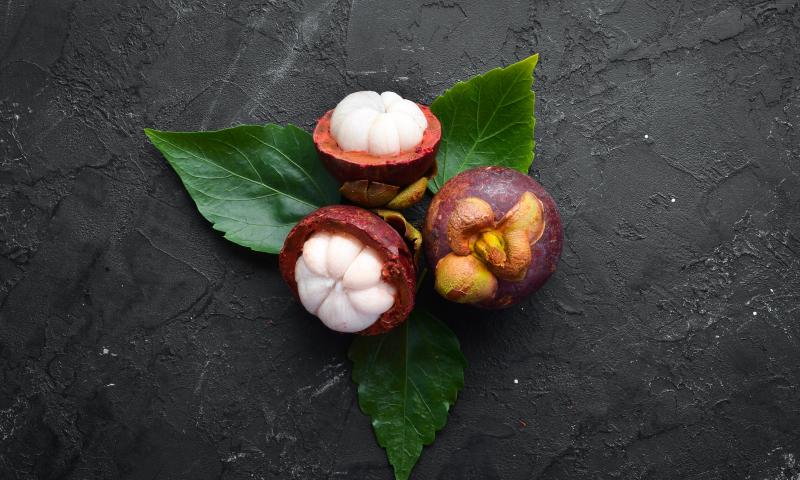 />
/>
Mangosteen (Garcinia mangostana), often hailed as the "queen of fruits," is a tropical treasure with a rich history and a plethora of potential health benefits.
Botanical Characteristics
Mangosteen is a slow-growing, evergreen tree that can reach heights of up to 25 meters. It has a pyramidal crown, dark-brown or nearly black bark, and thick, leathery leaves that are glossy and dark green. The fruit itself is a round, smooth berry, typically 3–7 cm in diameter, with a thick, purple rind encasing a white, juicy interior segmented into 4–8 segments.
Chemical Composition
The mangosteen fruit is rich in various phytochemicals, including xanthones, flavonoids, and tannins. Xanthones, in particular, are notable for their antioxidant properties and are predominantly found in the fruit's rind. The fruit is also a source of essential nutrients, such as vitamin C, dietary fiber, and minerals like potassium and magnesium.
Habitat
Mangosteen is native to Southeast Asia, with a habitat stretching from Indonesia to Malaysia and parts of Thailand. It thrives in tropical climates with consistent rainfall and high humidity, requiring well-drained soil with a rich organic content. The tree is highly sensitive to temperature variations and frost, necessitating a stable environment typical of equatorial regions.
Taste
The taste of mangosteen is often described as a perfect balance between sweet and sour, sometimes with a slight edge of bitterness. The flesh is soft, fibrous, and juicy, reminiscent of a combination of peach, strawberry, and lychee flavors. This unique taste profile makes mangosteen a beloved fruit by many who have the chance to experience its flavors.
Historical Facts
Mangosteen has a storied past, with its use in traditional medicine dating back centuries in its native lands. Historical records suggest that it was revered by the royalty of Southeast Asia, earning it the nickname "the queen of fruits." The fruit was also traditionally used in various cultural ceremonies and as a symbol of wealth and prosperity.
General Health Benefits
While direct health claims about mangosteen are regulated by the FDA, it is recognized that mangosteen contains compounds with antioxidant properties. These antioxidants can help to neutralize free radicals, potentially supporting overall health. Additionally, the fruit is low in calories and contains dietary fiber, which is beneficial for maintaining a balanced diet.
Indications for Use
Mangosteen is commonly consumed as a fresh fruit but is also available in various processed forms, including juices, powders, and supplements. It can be incorporated into a balanced diet as a source of nutrients and antioxidants. However, it's essential to consider individual dietary needs and preferences when incorporating new foods into your diet.
Conclusion
In conclusion, mangosteen is not only a fruit with a delightful taste but also a subject of interest due to its historical significance and potential health benefits. While more research is needed to fully understand its health implications, mangosteen remains a valuable addition to the dietary choices of those seeking to enjoy the flavors and nutritional benefits of tropical fruits.
